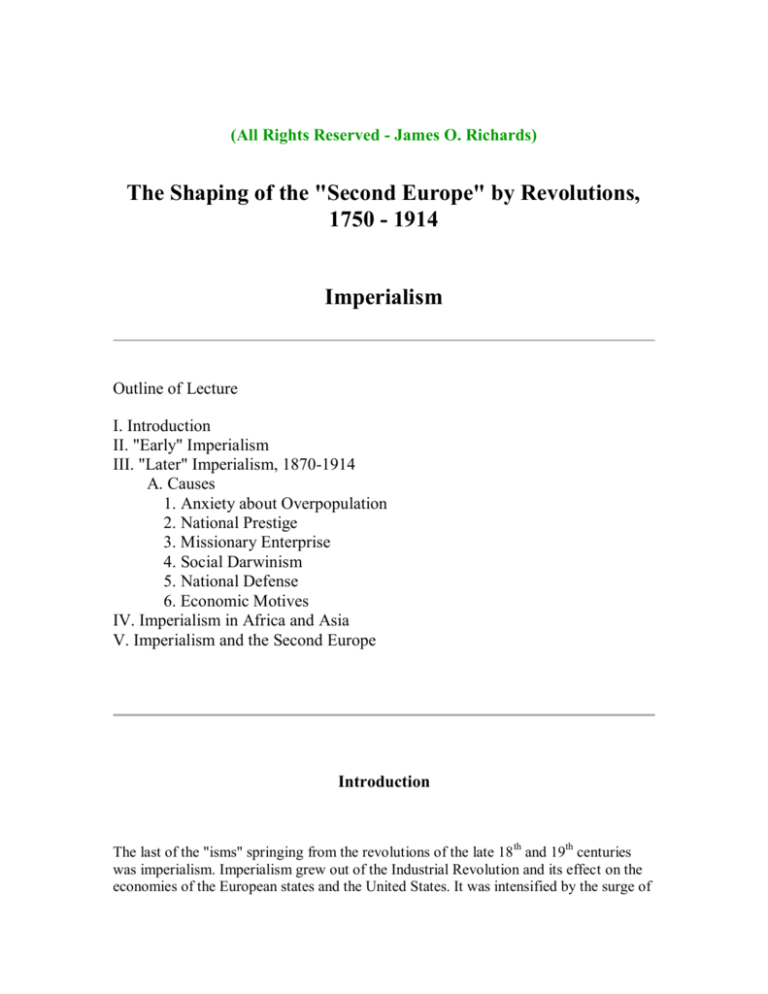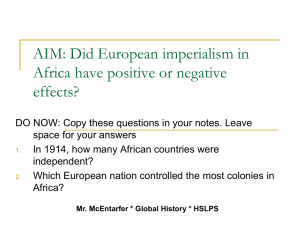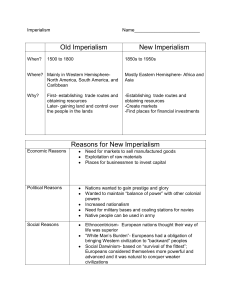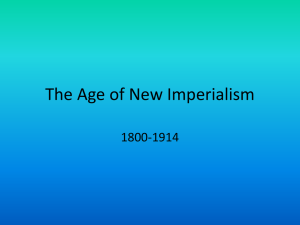
(All Rights Reserved - James O. Richards)
The Shaping of the "Second Europe" by Revolutions,
1750 - 1914
Imperialism
Outline of Lecture
I. Introduction
II. "Early" Imperialism
III. "Later" Imperialism, 1870-1914
A. Causes
1. Anxiety about Overpopulation
2. National Prestige
3. Missionary Enterprise
4. Social Darwinism
5. National Defense
6. Economic Motives
IV. Imperialism in Africa and Asia
V. Imperialism and the Second Europe
Introduction
The last of the "isms" springing from the revolutions of the late 18 th and 19th centuries
was imperialism. Imperialism grew out of the Industrial Revolution and its effect on the
economies of the European states and the United States. It was intensified by the surge of
nationalism during the 19th century which made states rivals for power and prestige. It
was also influenced in some ways that are more elusive by the Darwinian Revolution.
Social Darwinists, as we saw in an earlier session, saw imperialism as the natural struggle
among nation states for survival, a struggle in which an empire gave a state a competitive
edge over its rivals.
What is imperialism? In broad terms, it means the conquest, exploitation, or
extermination of one people by another. In the period we are talking about in this session,
1870-1914, it means the domination by the countries of Europe and the United States of
the undeveloped areas of Africa and Asia. The industrialized countries of Europe and the
United States possessed what Asia and Africa did not: industry, military power and
national discipline. The control exerted by the imperial powers over Asia and Africa
varied from commercial control to outright political domination. But imperialism was not
new to the 19th century. So we need to look first at an earlier form of imperialism. Then
we will examine the imperialism of 1870-1914 and the reasons why it occurred. Finally,
we will summarize the way imperial powers took control of Asia and Africa.
Imperialism, Phase I
European imperialism may be said to have begun as early as the late 11 th century when
Crusaders captured and dominated parts of the eastern Mediterranean. But Europe really
embarked on discovery and colonization in the late 15th and the 16th centuries. Nation
states regarded colonies as great prizes and competed intensely for them. The first stage
has been called the Iberian monopoly because Spain and Portugal led the race and split
the world into spheres of interest. In the 17th century France, England, and Holland broke
the monopoly. France and England claimed North America and Holland laid claims to a
rich empire in southern and southeastern Asia. Then the newcomers fought each other.
England challenged first the Dutch in the 17th century and then the French in the 18th
century. By 1763 England had secured from the French North America and India and was
the leading colonial power in Europe. Her navies commanded the seas. Then imperialism
entered a new phase.
From 1763 to 1870 imperialism declined for several reasons. First, with English control
of the seas, European power struggles no longer led to colonial rivalry. Second, most
countries lost colonies. France had lost all her American possessions by 1815. The
English lost their American colonies in 1783. Spain lost her South American colonies in
the early 19th century; Portugal lost Brazil as well. Third, economic theory in the late 18 th
and early 19th century turned against colonial domination as a national policy. The
Physiocrats and Adam Smith argued against mercantilism and restrictions on trade.
Instead, they preached laissez-faire. In Wealth of Nations, Smith said (among other
things) that the English colonies were a real burden, with only imaginary benefits to show
for it. The utilitarian, Jeremy Bentham, wrote a letter "Emancipate Your Colonies" which
was published in both England and France. The new economic theory about colonies
seemed to be borne out by the fact that trade between England and her former American
colonies actually increased after 1783. So the tide swung against imperialism.
Anti-imperialism dominated not only English but European foreign policy as well. In
England, the anti-imperialists were known as "Little Englanders" whose belief was that
the empire would eventually disappear. The two leading English political leaders of the
last half of the 19th century, Benjamin Disraeli and William Gladstone, were both antiimperialist before 1870. In 1852, Disraeli wrote: "These wretched colonies will all be
independent in a few years and are millstones around our necks." After 1847 free trade
dominated British policy. Anti-imperialism also prevailed in France and Germany.
France did acquire more possessions from 1815 to 1870, but it was because of private
initiatives, not government action. In 1861 France opened her colonies to world trade.
Germany followed the same line until 1870. Otto von Bismarck said in 1868: "All the
advantages claimed for the mother country are for the most part illusory. England is
abandoning her colonial policy; she finds it too costly." Then attitudes changed.
Imperialism, Phase II, 1870-1914
After 1870 opinion quickly changed and an imperialist spirit swept Europe and the
United States. Up to the beginning of World War I in 1914 countries staked out and
claimed new empires in Africa and Asia. Only England kept the policy of free trade.
Statesmen announced their conversion to imperialism and preached the necessity of
acquiring colonies. Disraeli did so in 1872. In France one of the leaders of the Third
Republic, Jules Ferry, declared, "every fragment of our colonial domain, every tiny
morsel should be sacred to us. . . .It is not a question of tomorrow's future, but the future
of fifty or a hundred years from now." A prominent French economist, Leroy Beautieu,
contended that "colonial expansion must occupy the first place in our national
consciousness." "It is for France," he continued, "a question of life or death; either France
will become a great African state or she will be in a century or two but a second-rate
power." The same spirit took over German thinking.
What had happened to change attitudes about imperialism? Why was there such a dash to
empire? There is no single explanation. Indeed, the best answer may be a combination of
several factors. Historians have offered the following as possible causes:
(1) Anxiety about overpopulation. Nations feared that too much population growth would
imperil their well-being. This may have caused political leaders to look abroad for places
to take excess population. But it has also been pointed out that fear of overcrowding was
not expressed as a serious problem until after the new imperialism began.
(2) To enhance national prestige. The acquisition of colonies and dependencies reflects
glory on the mother country. This is a psychological explanation: anything touching on
national pride becomes important when enough people think it is important. The space
race, for example?
(3) Missionary enterprise as a motive. Another phrase for this is "The White Man's
Burden". Imperialism is the obligation of western (white) man to take the blessings of
Christianity and western civilization to non-Europeans. Rudyard Kipling gave this idea
classic expression in a poem by that name. Those who are civilized (Westerners or
Europeans) must be ready to sacrifice their comfort and prosperity to bring the blessings
of civilization, law, and order to those who have no civilization. And they must not
expect thanks for doing it. Some lines worth quoting:
The White Man's Burden (1899)
Take up the White Man's burden-Send forth the best ye breed-Go bind your sons to exile
To serve your captives' need;
To wait in heavy harness,
On fluttered folk and wild-Your new-caught, sullen peoples,
Half-devil and half-child.
Take up the White Man's burden-In patience to abide,
To veil the threat of terror
And check the show of pride
By open speech and simple,
An hundred times made plain,
To seek another's profit,
And work another's gain.
Take up the White Man's burden-The savage wars of peace-Fill full the mouth of Famine
And bid the sickness cease;
And when your goal is nearest
The end for others sought,
Watch Sloth and heathen Folly
Bring all your hope to nought.
Take up the White Man's burden-Ye dare not stoop to less-Nor call too loud on Freedom
To cloak your weariness;
By all ye cry or whisper
By all ye leave or do,
The silent sullen peoples
Shall weigh your Gods and you.
(4) Social Darwinism as a cause. As we saw in the session on Darwin and Social
Darwinism, the argument was that imperialism was pursued and justified by the law of
"survival of the fittest". The imperial powers by conquering the colonial peoples had
proven they were superior. By nature's law, then, they were entitled to the lands, and
persons, they had conquered. This sometimes took on a racial bias, in that the conquerors
were white and their subjects non-white. And it took on a nationalist bent as well when a
Social Darwinist held up a particular people such as the Anglo-Saxons as a people
destined to rule others (white as well as non-white) because of its superiority.
(5) National defense as a reason. Nations become imperialist to protect themselves
against other imperial powers and against the vast hordes of peoples around the world
who threaten civilization, peace and order. Theodore Roosevelt argued for imperialism as
a defense against the uncivilized peoples when he said in Expansion and Peace (1899)
that world peace would occur only when civilized nations expanded around the globe.
Imperialism also was necessary to protect a country against other imperial powers. To
project national power a country needed colonies for military and supply bases.
(6) A range of economic motives for imperialism. These motives were tied to the
industrial growth of European countries during the 19th century. Industrial powers needed
empires for at least three reasons: (a) as a source of raw materials; (b) as markets; and (c)
as outlets for investment.
(A) Raw materials such as cotton, rubber, petroleum, coal, iron, copper, zinc, and
nickel were necessary to a nation's industrial growth. If not available, or not available in
large quantities, these had to be imported. Because they were found plentifully in
undeveloped regions, industrial nations sought to secure these areas for themselves. The
new goal was not free trade but a self-sufficient empire which contained all the raw
materials needed for industrial growth. Hence imperialism as a national policy.
(B) By 1870 nations needed new markets to keep their industries growing and those
markets could not be found in other industrial countries. All industrial states, except
England, began to set up high tariffs to protect their domestic industries. Even home
markets could not absorb all the output of a nation's industry. So industrialists looked
abroad for markets, and expected their governments to help them. Governments
responded. In 1899, for example, the French governor of Indo-China declared to a group
of businessmen that the colony's sole reason for being was to serve as a market for
French manufactured goods.
(C) Industrial nations also needed colonies as places to invest surplus capital. By the
late 19th century industrialists and businessmen had so much surplus capital to invest that
interest rates began to fall. They turned overseas to undeveloped areas where capital
could be invested at better rates. As Jules Ferry, quoted earlier, said: "For wealthy
countries colonies are most advantageous investments. It is in the interest of France,
which is glutted with capital, to consider this aspect of the question." Bearing out this
motive is the amount of investment abroad. By the beginning of the First World War
England alone had invested the equivalent of 20 billion abroad; France about 8 billion;
and Germany about 5 billion.
Which of the causes of imperialism cited above is the best explanation? That depends on
what one believes to be the major motivator of human activity. If one believes the
material factor to be the most important, economics will be the most convincing reason.
And other motives will be seen as merely rationales for greed or self-interest. George
Bernard Shaw, the playwright, dismissed humanitarian or religious reasons by saying:
"When an Englishman wants a thing, he never tells himself that he wants
it. He waits patiently until there comes to his mind, no one knows how, a
burning conviction that it is his moral and religious duty to conquer those
who have the thing he wants. . . .He is never at a loss for an effective
moral attitude. As a great champion of freedom and national independence
he conquers and annexes half the world, and calls it Colonization."
In a similar vein Sir Sydney Olivier (later Lord Olivier), Governor of Jamaica (19071913), remarked "No nation has ever colonized, annexed, or established a sphere of
influence from motives of disinterested philanthropy towards a native people." Are
motives other than economics calculated, convenient justifications of imperialism, but not
real reasons for imperialism? Think about that.
Regardless of how you emphasize one or the other of the causes, starting in 1870 there
was what is best called a mad scramble for spheres of influence, colonies, and
protectorates. England increased its empire by millions of square miles and almost 60
million subject peoples by 1914. France accumulated a smaller empire, adding almost 40
million additional peoples. Germany, Belgium, and Portugal also got sizable empires.
Most of these new possessions were in African and Asia. In 1875 the interior of Africa
was largely unexplored; by 1900 almost the entire continent was claimed by some
European power. In Asia only Japan held on to a measure of independence. Even the
Pacific islands became colonies or protectorates.
?
Which of the causes of Imperialism is the most convincing to you? Why?
Imperialism in Africa and Asia
European nations had long been familiar with the coastal areas of Africa, particularly the
Mediterranean side. Before 1870, however, few had African possessions. France had
acquired Algeria in 1830. The British had a toe hold in South Africa. England in 1875
became interested in Egypt because of the Suez Canal. They bought a controlling interest
in the company which ran the canal. In 1882 to safeguard this interest, England took
control of Egypt, although they left it as a nominally sovereign state.
Virtually no European country was interested in the interior of Africa. But starting in the
middle of the 19th century missionaries began to enter the interior in search of converts.
The most famous of these was David Livingstone (1813-1873) who explored much of the
interior and mapped it. On a trip home before his final missionary journey, Livingstone
said, "I go back to Africa to open a path for commerce and Christianity." So famous had
Livingstone become that when he was thought to be lost or dead in the African interior,
the New York Herald sent Henry Morton Stanley (1840-1904) to find him. Stanley stayed
in Africa after Livingstone's death and became an explorer and advocate for imperialism
himself. Thinking that the center of Africa (now the Democratic Republic of Congo)
contained rich resources, Stanley tried to get the English to annex it. When they rejected
his idea, he convinced the Belgian king to support an expedition to set up a Congo Free
State. At first a private venture, the Congo became a Belgian colony in 1908.
By 1900 European countries had carved up Africa until only about 10% remained outside
the control of the imperial powers. England held large regions on the west coast, the east
coast, and south Africa. France controlled most of northwestern Africa. Germany held
lands in the southwest, and the west and east coasts. Belgium held the center.
Europeans were not able to establish in Asia the same control they had in Africa. China
and Japan were not undeveloped; indeed, both had long established governments. Japan
was so successful in maintaining her independence that the Japanese soon became
themselves an imperialist power. China, on the other hand, while strong enough to avoid
being colonized, was too weak to escape commercial domination by Europeans. In the
late 18th and early 19th centuries Chinese goods such as tea, silk and porcelain were in
great demand in Europe. Because the Chinese wanted almost nothing in return there was
a trade imbalance requiring payment in bullion. Then the British began to use opium,
mainly from their colony of India, as currency for the goods they purchased, despite the
Chinese empire's laws against opium importation. (Opium is derived from the juice of
poppy seed pods, as is heroin.) The result was a huge increase in opium addiction which
affected all levels of Chinese society. When the empire tried to crack down on the opium
trade, the British responded with military force. After losing the Opium War of 1839-42
to overwhelmingly superior force, the Chinese were forced to give Hong Kong to Britain,
grant British businessmen special concessions and extraterritoriality, and to pay
reparations. Other European nations, including the United States, made similar demands
and got similar concessions.
By the end of the century European states had marked out most of China into "spheres of
influence", giving them exclusive trading rights in their own sphere. The Chinese were
divided about what to do. One group wanted to westernize and strengthen China against
its enemies. That was the official policy of the Manchu emperor. But a secret antiwestern group known as the "Boxers" ("Righteous Harmony Fists") wanted to throw all
Europeans out of China. Boxers detested all westerners but especially missionaries who
were undercutting Chinese culture and traditions by preaching against ancestor worship,
the central tenet of Confucianism. At the end of the century Boxers began to attack and
murder European missionaries, businessmen and Chinese Christians, culminating in 1900
in a full scale attack on the European Legations in Beijing and Tianjin. The response
from western countries was swift and merciless. An Allied force of troops from all
European trading countries invaded China, put down the Boxer Rebellion, and forced
additional concessions from the Chinese emperor. Thus the pattern of imperialism in
China was not annexation or direct rule, but virtual control to secure commercial
advantages. The Chinese gave in to these demands because they were militarily too weak
to stand up to European technology, but they bitterly resented this century of humiliation
as they called it. Chinese hostility to the west has deep roots going all the way back to the
way their trading doors were forced open in the middle of 19 th century.
?
Western imperialism is embarrassing, isn't it? Have African and Asian countries overreacted to this history? After all modern western countries have disavowed this part of
their history. What do you think?
Imperialism and the Second Europe
Can Imperialism be harmonized with Enlightenment ideals? How does one square the
view of man as created equal and born with the inalienable rights of life, liberty, and the
pursuit of happiness with a policy which makes one people the master of another? Is
there at least implicit in the theory of imperialism an acceptance of the inequality of men?
In Kipling's phrase, are the "new-caught, sullen peoples, Half-devil and half-child" really
the equal of their imperial masters? Do these subject peoples have the right to the social
contract and to revolution? Is the future bright with promise for them too? As subjects?
Perhaps if they give up their "Sloth and Heathen folly"? Is there anything of the
Enlightenment in imperialism?
Imperialism is the last of the "isms" driving change in the 19th century. Like Socialism it
sprang from the Industrial Revolution and the rivalry that developed among European
nations as they underwent industrialization. That rivalry reached such an intense pitch
toward the end of the century that nations began making alliances to safeguard their
interests, committing them to come to the aid of their allies if attacked. When the heir to
the Austrian empire was assassinated in 1914, statesmen began to call due their
obligations to one another. And World War I began.










